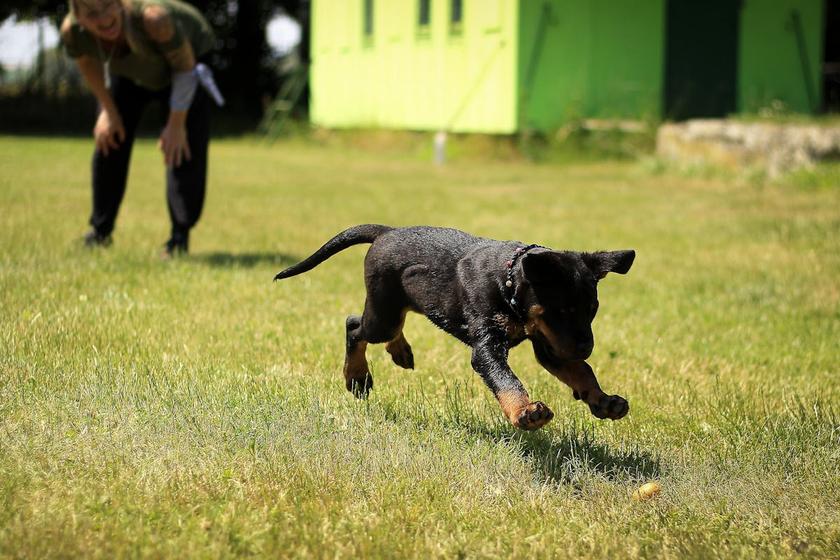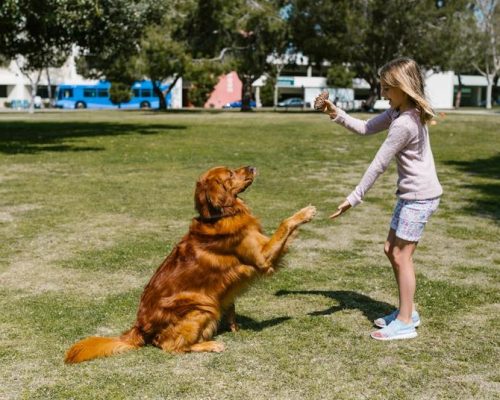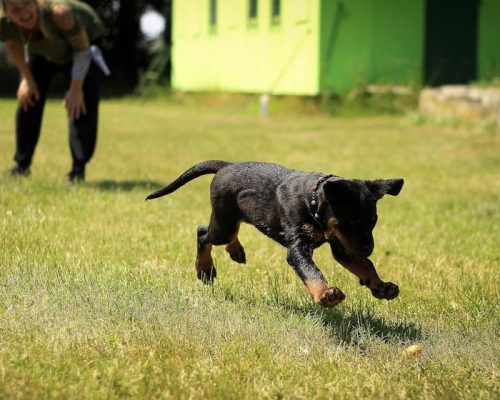In the realm of canine companionship, dog socialization stands as a cornerstone for fostering harmonious relationships between dogs and humans.
Furthermore, it encapsulates a journey of mutual understanding, communication, and trust, vital for the well-being of our beloved furry friends.
Dog socialization embodies the process through which dogs acclimate to various stimuli in their environment. This includes other animals, people, objects, and experiences. It’s not merely about interaction but about laying the groundwork for a confident, well-adjusted canine companion.
The Importance of Early Dog Socialization
The Critical Window
During the formative stages of a dog’s life, typically between the ages of 3 to 14 weeks, lies a critical period where socialization profoundly shapes their behaviour and temperament.
This window presents a golden opportunity to mould positive associations and build resilience against future stressors.
Benefits of Early Dog Socialization
Reduced Aggression and Fear
Early exposure to diverse environments and stimuli helps mitigate fear responses and diminishes the likelihood of aggressive behaviours.
It is imperative to instil confidence and trust, dogs learn to approach new situations with curiosity rather than apprehension.
Improved Behavior in Various Environments
Puppies who undergo early socialization exhibit greater adaptability to novel situations, making them less prone to anxiety or reactivity in unfamiliar settings.
Whether navigating bustling city streets or tranquil parks, a well-socialized dog remains calm and composed amidst diverse surroundings.
Enhanced Confidence and Adaptability
Socialization fosters a sense of security and self-assurance in dogs, enabling them to navigate life’s challenges with resilience.
From encountering new people and animals to exploring unfamiliar terrain, a well-socialized dog approaches each experience with a paw-sitive attitude and an eagerness to learn.
Dog Socialization Techniques
Puppy Parties
Organizing supervised playdates with other puppies allows young dogs to engage in appropriate social interactions while honing their communication skills.
These controlled environments provide valuable opportunities for pups to learn social cues, practice sharing, and develop bite inhibition under the watchful eye of their human counterparts.
Positive Exposure
Exposing puppies to a wide array of stimuli in a positive and controlled manner lays the groundwork for a well-rounded adult dog.
Introductions to friendly strangers, well-behaved dogs, and different surfaces, sounds, and smells help puppies build confidence and adaptability, preparing them for life’s diverse experiences.
Obedience Training
Incorporating basic obedience training into socialization routines not only cultivates good manners but also reinforces positive interactions with both humans and other animals.
Commands such as “sit,” “stay,” and “come” serve as building blocks for effective communication, fostering trust and cooperation between dogs and their owners.
Challenges in Socializing Adult Dogs
Addressing Fear and Anxiety
When faced with fear or anxiety, adult dogs may exhibit avoidance behaviours or aggression in response to perceived threats.
Patient, gradual exposure to trigger stimuli coupled with positive reinforcement techniques can help desensitize fearful dogs and build their confidence over time.
Dealing with Trauma
Rescued dogs with traumatic pasts require special attention and patience during the socialization process. Building trust through gentle interactions, and predictable routines.
Furthermore, positive reinforcement lays the foundation for rehabilitation and eventual integration into loving homes.
Understanding Behavioural Issues
Behavioural issues such as aggression, resource guarding, or excessive fear can pose challenges to successful socialization.
Identifying underlying triggers and addressing them through behaviour modification techniques, coupled with professional guidance when necessary, is essential for fostering positive social interactions in adult dogs.
The Role of Breed and Temperament in Dog Socialization
Breed-Specific Considerations
Each dog breed possesses unique traits and predispositions that influence their socialization needs and preferences. Some dogs are easier to train than others.
Understanding breed-specific characteristics allows owners to tailor socialization strategies to accommodate their dog’s temperament, energy level, and communication style effectively.
Temperament Assessment
Conducting a temperament assessment helps owners gain insight into their dog’s personality, strengths, and areas for growth.
By recognizing individual preferences and sensitivities, owners can tailor socialization experiences to suit their dog’s comfort level, maximizing positive outcomes and minimizing stress.
Socialization Beyond the Puppy Stage
Adolescent Dogs
As adolescent dogs undergo physical and behavioural changes, they may experience fluctuations in confidence and sociability.
Consistent, positive exposure to various stimuli combined with continued training and reinforcement helps adolescent dogs navigate this transitional phase with grace and maturity.
Adult Dogs
Socialization isn’t reserved solely for puppies but remains a lifelong journey for dogs of all ages. Regular exposure to new experiences, environments, and social interactions keeps adult dogs mentally stimulated, emotionally fulfilled, and socially adept, enriching their overall quality of life.
Dog Socialization in Different Environments
Urban Environments
Urban dwellers face unique socialization challenges, including exposure to loud noises, crowded spaces, and unpredictable encounters.
Furthermore, utilizing controlled environments such as dog parks, obedience classes, and structured walks helps urban dogs acclimate to city life while fostering positive social interactions.
Suburban and Rural Environments
In suburban and rural settings, dogs may encounter fewer stimuli compared to their urban counterparts, but socialization remains equally important.
Engaging in outdoor activities, attending community events, and arranging playdates with other dogs provide valuable socialization opportunities while fostering a sense of belonging within the community.
Indoor Environments
For dogs primarily confined to indoor environments, socialization efforts must extend beyond physical outings to cover enrichment activities within the home.
Interactive toys, puzzle feeders, and obedience training exercises not only stimulate the mind but also strengthen the bond between dogs and their owners, promoting overall well-being.
Socialization and Health
Mental Well-being
Socialization plays a pivotal role in nurturing a dog’s mental well-being by providing opportunities for mental stimulation, social engagement, and emotional fulfilment.
Positive social interactions boost confidence, reduce stress, and foster a sense of security, contributing to a happier, more balanced canine companion.
Physical Health Benefits
Regular socialization promotes physical health by encouraging exercise, reducing anxiety-related behaviours, and preventing obesity.
Engaging in outdoor activities, interacting with other dogs, and exploring new environments not only keep dogs physically fit but also support their immune system and cardiovascular health.
Socialization and Longevity
Studies have shown that well-socialized dogs tend to live longer, healthier lives compared to their isolated counterparts.
By nurturing strong social bonds, maintaining mental and physical fitness, and minimizing stress, socialized dogs enjoy a higher quality of life and increased longevity.
Overcoming Dog Socialization Challenges
Working with a Professional Trainer
When faced with persistent socialization challenges or behavioural issues, consulting a professional dog trainer or behaviourist can provide invaluable guidance and support.
Trained professionals assess individual needs, develop customized training plans, and offer practical solutions to address specific concerns, empowering owners to navigate socialization hurdles effectively.
Patience and Persistence
Successful socialization requires patience, consistency, and a willingness to adapt to individual needs and preferences.
By embracing the journey with an open heart and a steadfast commitment to positive reinforcement, owners can overcome challenges, build trust, and foster paw-sitive connections that last a lifetime.
Conclusion
It is best to prioritize early exposure, understanding individual needs, and fostering positive experiences. This paves the way for a lifetime of paw-sitive connections, enriching both our lives and those of our beloved furry friends.
In a world brimming with sights, sounds, and experiences, dog socialization serves as a guiding light, illuminating the path to a fulfilling, enriching bond between dogs and their human counterparts.
By embracing dog socialization as a lifelong journey, we embark on a shared adventure of growth, learning, and love. We can forge paw-sitive connections that endure the test of time.






